Lees onze recente magazine-artikelen
Om het academisch jaar af te sluiten en de zomer goed te beginnen, hebben we al onze magazine-artikelen van januari tot juli 2023 op een rijtje gezet. Zo kun je ze tijdens de vakantie nog eens rustig nalezen. In elk artikel vertelt een onderzoeker van de RUG over zijn of haar vakgebied.
Op zoek naar trickle-down effecten van het vrouwenquotum
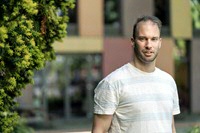
Sinds bijna anderhalf jaar kent Nederland een verplicht vrouwenquotum voor beursgenoteerde bedrijven. Zoltán Lippényi onderzoekt de effecten daarvan buiten de bestuurskamers. Leiden meer vrouwen aan de top tot betere carrièrekansen en minder loonongelijkheid voor vrouwen in de rest van het bedrijf? Lees meer
Als onderzoek een onderneming wordt
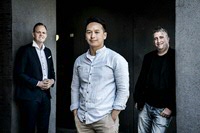
Als onderzoeker wil je graag dat jouw onderzoek hét verschil maakt in de samenleving. Dat verschil zou je kunnen maken door je kennis naar de markt te brengen en een startup te beginnen. Maar daar komt een hele nieuwe uitdaging bij: de “business” kant van een bedrijf. Daar heeft een onderzoeker vaak hulp bij nodig. In Groningen kunnen start-ups dan bijvoorbeeld aankloppen bij Stichting Business Generator om hulp te krijgen bij de eerste stappen. Ze helpen start-ups uit alle wetenschappelijke richtingen, zo ook medische start-up Protyon. Lees meer
Open House of Connections: een kijkje in wetenschap voor een duurzame toekomst
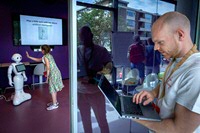
Ouderen en jongeren, stadjers en Ommelanders: tijdens het Open House of Connections afgelopen zaterdag 24 juni konden mensen in de nieuwe leer, werk- en ontmoetingslocatie van de RUG kennismaken met het werk aan een duurzame toekomst. RUG-wetenschappers zorgden met proefjes voor verblufte gezichten en hielden prikkelende lezingen voor een breed publiek. Rector magnificus Cisca Wijmenga en lid van het College van Bestuur Hans Biemans deelden taart uit. Lees meer
Recht op een gezonde mond
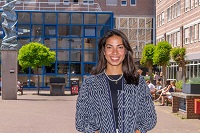
Wereldwijd zijn er 550 miljoen kinderen die met onbehandelde gaatjes (cariës) rondlopen, terwijl het steeds duidelijker wordt dat gebitsproblemen een nadelige uitwerking hebben op de rest van je gezondheid. Belangrijk dus om je mond gezond te houden. En daar kun je niet vroeg genoeg mee beginnen, vindt Dominique Mollet. De promovendus Gezondheidsrecht wil dat er door juridisch onderzoek meer aandacht komt voor mondgezondheid. Hiervoor werkt ze onder andere samen met de Aletta Jacobs School of Public Health. Lees meer
Vol overtuiging op weg naar een plantaardige samenleving
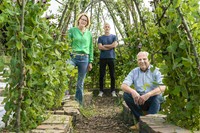
Rob van Haren (Hanzehogeschool), Bianca Harms (NHL Stenden) en John Hoeks (RUG) werken bij verschillende instellingen, maar met een niet te missen gedeelde passie. Gesteund door het Aanjaagfonds van de Universiteit van het Noorden wil het drietal de transitie naar een plantaardige samenleving versnellen. ‘Ons eindpunt is helder, maar dat moet via kleine stapjes. Wij vertrouwen op de kracht van gezondheid, duurzaamheid en ethiek.’ Hun project is genomineerd voor de verkiezing Duurzame Dertig, georganiseerd door Dagblad van het Noorden, de Leeuwarder Courant en het Friesch Dagblad. Lees meer
Revalideren met behulp van virtual reality-games
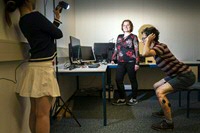
Digital Health Care Technologies, ook wel eHealth, kunnen de gezondheidszorg drastisch veranderen. De combinatie van Virtual Reality, Augmented Reality, wearables, telehealth, telemonitoring en Artificial Intelligence opent nieuwe deuren voor gepersonaliseerde zorg, verbeterde patiëntbetrokkenheid en efficiëntere behandelingen. De Jantina Tammes School ondersteunt onderzoekers die deze technologieën blijven ontwikkelen en speelt een actieve rol in de samenwerking tussen zorgverleners, beleidsmakers en industrieën om de voordelen voor patiënten te maximaliseren. Lees meer
Groningen CO2-neutraal in 2030
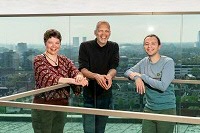
Samen met de Gemeente Groningen, Hanzehogeschool Groningen en Alfa College werkt de Wubbo Ockels School for Energy and Climate (RUG) aan het actieplan ‘Groningen CO2-neutraal in 2030,’ onderdeel van de EU-'Mission on 100 Climate-Neutral and Smart Cities by 2030'. De missie heeft als doel om tegen 2030 tenminste 100 Europese klimaatneutrale en slimme steden op te leveren en ervoor te zorgen dat deze steden ook fungeren als experimenteer- en innovatiehubs, om alle Europese steden in staat te stellen tegen 2050 klimaatneutraal te worden. Lees meer
De onvermijdelijke opmars van Het Evangelie in Brazilië
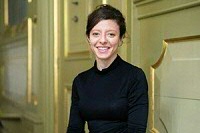
Op dit moment is Brazilië het land met de meeste katholieken ter wereld, maar naar verwachting zullen er in 2035 meer protestanten dan katholieken zijn. Vooral de Pinkstergemeenten lijken te groeien. Deze gemeenten zijn onderdeel van de Evangelisch Christelijke Beweging, een stroming binnen de protestantse kerk. Nieuw lid van De Jonge Akademie Groningen en onderzoekster Manoela Carpenedo bestudeert de opmars van deze beweging en de invloed ervan op identiteit, cultuur, en politiek.
CurioUs: tweerichtingsverkeer tussen burger en wetenschap
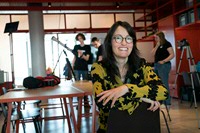
De bodem induiken om wormen te tellen, het plaatsen van een regenmeter in eigen tuin, of het lenen van een infraroodcamera om te zien op welke plekken je huis warmte verliest. Bij CurioUs kun je tegelijkertijd een bijdrage leveren aan wetenschappelijk onderzoek, én meer leren over je eigen leefomgeving. Lees meer
Last van een terror-manager?
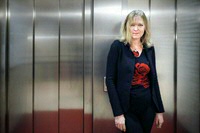
De kans is groot dat je er ooit mee te maken krijgt: een leidinggevende die jou of een collega tot mikpunt maakt. Organisatiepsycholoog Barbara Wisse doet onderzoek naar dit letterlijk ziekmakend gedrag en legt uit wat je ertegen kunt doen. Lees meer
Taal voor de toekomst
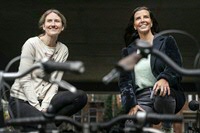
Een kwart van de bevolking spreekt thuis een andere taal dan het Nederlands. Toch zien we deze culturele en talige variëteit niet terug in het onderwijs. Daar geldt het Nederlands nog altijd als de belangrijkste voertaal. Wat voor impact heeft dat op de meertalige bevolking en op hun rol in de maatschappij? Hoe kunnen we de talige en culturele diversiteit van ons land beter benutten? Dat willen de Nederlandse universiteiten onder de loep nemen met het project Taal voor de Toekomst. Lees meer
Onvrede verklaard met de Nederlandse kaart
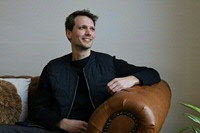
Tractoren op het Binnenhof, klimaatactivisten op de A12, een schreeuwende man met een fakkel bij het huis van minister van Financiën Sigrid Kaag: de kloof in de samenleving lijkt groot. Ook de uitslag van de Provinciale Statenverkiezingen op 15 maart laat zien dat er onvrede is met het kabinet en gevestigde partijen. Die onvrede uit zich het sterkst in regio’s buiten de Randstad. Hoe kan dit worden verklaard? Promovendus Bram van Vulpen probeert die vragen te beantwoorden. Lees meer
Nardi Steverink geeft ouderen met cursus meer grip op leven
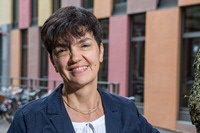
Gezond en gelukkig ouder worden? Het is niet alleen een kwestie van goede genen, maar ook van zelf de regie over je leven nemen, zo blijkt uit het onderzoek van socioloog Nardi Steverink. Om mensen hierbij te helpen ontwikkelde ze de cursus GRIP en GLANS. Cursist Zwanet van Dijken (76) blikt enthousiast terug. “Ik zou het iedereen zonder meer aanraden.” Lees meer
Marc Hertogh: ‘Onderwijsvernieuwing is experimenteren’
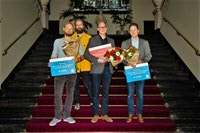
Studenten laten adviseren in een lopende wetgevingsprocedure voor de Tweede Kamer, dat is wat hoogleraar rechtssociologie Marc Hertogh voorstelde. De studenten verrasten Hertogh met de kwaliteit van hun werk, ondanks het grillige verloop van het proces en veranderende deadlines. Kamerleden waren onder de indruk van de adviezen. Zijn studenten nomineerden het vak voor de Best Practice in Teaching & Learning Award 2023. Tot zijn eigen verbazing won Hertogh de prijs voor het 'Seminaar Beleidsanalyse’ waarin active learning, recht in de praktijk en praktijkgerichte competenties van studenten de belangrijkste speerpunten zijn. Lees meer
Onderzoek naar alvleesklier zebravis biedt beter inzicht in diabetes
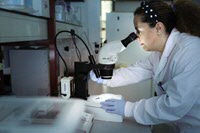
Noura Faraj's eigen ervaringen motiveerden haar om een promotietraject te volgen voor meer inzicht in diabetes type 1 (T1D). Door de zebravis als modelorganisme te gebruiken om de functie van de alvleesklier te bestuderen hoopt ze een waarschijnlijke oorzaak van deze aandoening te achterhalen en in de toekomst te voorkomen dat sommige mensen T1D ontwikkelen. Lees meer
Een sprong in het diepe: van onderzoek naar ondernemen
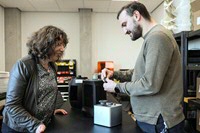
Ideeën hebben. Experimenteren en uitproberen. De samenleving willen veranderen. Voor veel onderzoekers is dit allemaal dagelijkse kost. Maar wat als je je idee op de markt wilt brengen? Dat is een stap die voor onderzoekers vaak niet vanzelf komt. Bij de RUG zijn er daarom een aantal organisaties die daarbij kunnen helpen, waaronder VentureLab. Zo ontstond SlimStampen, een programma dat leerlingen in vijf landen inmiddels gebruiken. Lees meer
Ventiel voor onze verstopte rechtspraak
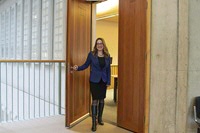
Het Nederlandse juridische systeem lijdt aan een infarct. Rechtszaken stapelen zich op en slepen zich voort. Al bijna twee decennia lang onderzoekt én bepleit Laura Peters de invoering van procesafspraken in Nederland als ‘bypass’. ‘Nederland loopt achter op andere landen.’ Lees meer
'Troost is betekenis kunnen geven aan verlies'
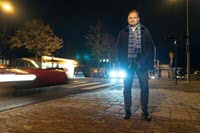
Betekenis kunnen geven aan verlies. Dat is troost. Christoph Jedan, hoogleraar ethiek en godsdienstfilosofie, verdiepte zich in troostliteratuur van theologen en van filosofen uit de Klassieke Oudheid. Zo ontwikkelde hij een troostmodel met vijf elementen. Veerkracht is daar een van. Lees meer
Gelijkheid – Ook tussen de lakens
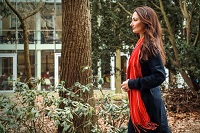
We vinden het vaak moeilijk om over seks en seksualiteit te praten. Het is taboe, privé en misschien zelfs een beetje vies. Niet vreemd, wel kwalijk, vindt onderzoeker Charmaine Borg. Want daardoor verandert er niets aan onze (ouderwetse) opvattingen over seks. En vooral vrouwen zijn daar de dupe van. Hoog tijd om daar, rond Internationale Vrouwendag, eens aandacht aan te besteden. Lees meer
Vrouwen aan het woord in nieuwe Griekse Mythen
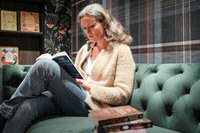
Griekse mythen: spannende, mysterieuze en soms bizarre verhalen uit de oudheid. Ze behandelen vaak ethische kwesties en schurende conflicten. Zo ook de onenigheden tussen man en vrouw. Klassieke mythologische verhalen zijn in een bepaalde tijdsgeest en vanuit een specifiek, vaak mannelijk, perspectief geschreven. Maar hoe zouden die verhalen lopen als we er met een hedendaagse blik en vanuit vrouwelijk oogpunt naar kijken? Lees meer
Hoe een trollenleger de oorlogsretoriek van het Kremlin verspreidt
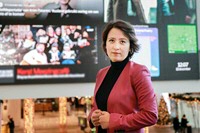
Dr. Lisa Gaufman, universitair docent Russische discours en politiek, onderzoekt de retoriek van het Kremlin op sociale media. Een verhaal over online spotprenten en polariserende troll-accounts die zich voordoen als bezorgde burgers. Lees meer
Lift naar de inclusieve werkvloer
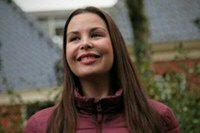
Er is werk zat, en toch staan mensen met een beperking nog vaak aan de kant. Een plus een is twee, zou je denken: dit is hét moment om deze groep arbeidskrachten aan een baan te helpen. De wens is er, ook aan de universiteit, maar tot uitvoering komt het nog niet altijd. Werk aan de winkel, zegt Charlotte Venema, projectmanager Wet Banenafspraak bij de RUG. Lees meer
Pas op: onzichtbare beïnvloeding!
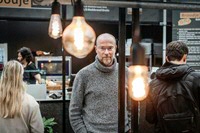
Of je nu op straat wordt aangesproken, de krant leest of door Instagram scrolt, constant word je beïnvloed. Ook wanneer we ons er niet bewust van zijn, heeft dit effect op onze overtuigingen en ons gedrag. Hoe kan het dat wij zo gemakkelijk te beïnvloeden zijn? En hoe verweren we ons hiertegen? Bob Fennis, hoogleraar Consumentengedrag aan de Faculteit Economie en Bedrijfskunde, houdt zich al jaren met deze vragen bezig. Lees meer
Van afvalstoffen naar duurzame kerosine
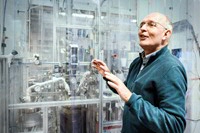
Erik Heeres is geen klassieke wetenschapper. De geboren Pekelder ontwikkelde zich tot succesvol projectleider van grote Nederlandse en Europese onderzoeksconsortia. Nog altijd heeft de hoogleraar Chemische Technologie een warm hart voor een duurzaam en innovatief Noord-Nederland. Lees meer
In dialoog met de ander, in dialoog met de natuur
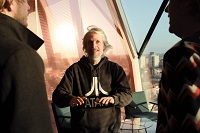
Hij promoveerde in de logica met een focus op informatica, en was zowel student als docent aan Stanford. Nu kijkt hij vanuit Groningen hoe dialoog de kloof in de samenleving kan verkleinen: Marc Pauly, onderzoeker aan de Faculteit Wijsbegeerte, legde geen rechtlijnige weg af. Toch is zijn missie helder: hij wil meer begrip creëren, tussen mensen onderling én tussen mensen en de natuur.
Op zoek naar de ideale verf
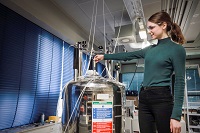
Muren, meubels, brillenglazen…. Bijna alles om je heen is geverfd of heeft een coating. Verf op waterbasis is daarbij steeds meer de norm, maar ook deze verf is niet geheel vrij van bestanddelen die van olie zijn gemaakt. Hanneke Siebe werkt aan een volledig duurzame verf, op basis van arabische gom. Lees meer
'Alleen een dalend emissieplafond dwingt tot energietransitie'
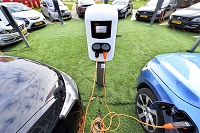
Wie zijn benzineauto inruilt voor een elektrische en zonnepanelen op zijn dak legt, helpt mee om de uitstoot van CO2 te beperken. Toch? Ja en nee. ‘Een elektrische auto helpt wel, maar zonnepanelen niet’, zegt hoogleraar energie-economie Machiel Mulder. Om duidelijk te maken hoe dat zit schreef hij een boek: Energietransitie – Eerst snappen, dan doen. Lees meer
